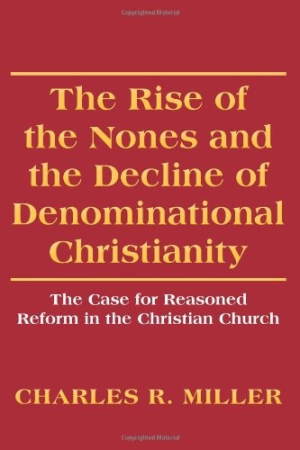The Rise of the Nones and the Decline of Denominational Christianity
The Case for Reasoned Reform in the Christian Church
Charles R. Miller passionately wants Christian leaders to wake up and recognize the issues that are turning people away from the church.
Each year, the number of people identifying themselves as not affiliated with any formal religious group or denomination increases. Charles R. Miller, who attended and held leadership positions in the Assembly of God church for more than forty years, knows firsthand the frustration and disillusionment these “Nones” experience. In The Rise of the Nones and the Decline of Denominational Christianity, Miller offers recommendations to Christian leaders on changes that must be made if organized religion is to reconnect with those who have left the fold.
For twenty years after leaving the church, Miller stayed away from any structured religious organization to research the beginnings of Christianity and the Bible and to seek his own answers to some of the issues and practices he had come to question. He concluded that he, like most other “Nones,” realized the doctrine of Christian churches appeared to be based on rules that tell a person what not to do. The result was excessive legalism that seemed to have little, if any, biblical support. A wide diversity of scriptural interpretations leave “Nones” unsure of which denomination’s version of the truth is correct, so they prefer to arrive at their own understanding.
Miller also addresses topics such as intolerance, closed-mindedness, and separation of church and state. He presents a view of homosexuality that will be met with opposition in some denominations, but he is to be commended for his caring and logical presentation imploring Christians to be more compassionate and less judgmental. Miller expresses particular disgust with false prophets (such as several television preachers) and false teachings (e.g., Christians should expect to have abundant material blessings), which he cites as two of the main reasons he left the church.
The content of the book is challenging and enlightening, and Miller’s straightforward and candid style adds an appropriate sense of urgency to his topic. Yet the all-text, yellow-and-red front cover is unnecessarily drab, and the four endorsements on the back cover are unattributed. The inside design would benefit from subheadings to break up page after page of text. That said, these are minor flaws that do not detract from Miller’s bold and powerful debut.
Miller eventually returned to the church, but his insights from years away are compelling and well documented. Though his commentary seems to attack organized religion at times, the underlying tone throughout the book is a passionate call to church leaders to wake up and recognize the issues that are turning people away from religion. Persuasive and well-reasoned points are intended to create a positive impact and encourage churches to relate to the “Nones.”
Miller has masterfully achieved his goal of shedding light on problem areas that Christian churches must confront and reevaluate to effectively fulfill their missions.
Reviewed by
Jeff Friend
Disclosure: This article is not an endorsement, but a review. The publisher of this book provided free copies of the book and paid a small fee to have their book reviewed by a professional reviewer. Foreword Reviews and Clarion Reviews make no guarantee that the publisher will receive a positive review. Foreword Magazine, Inc. is disclosing this in accordance with the Federal Trade Commission’s 16 CFR, Part 255.

